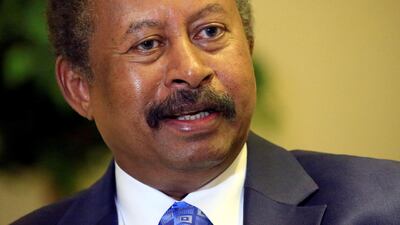Sudan's new prime minister says reintegrating the country into the international community and drastically reducing military spending will be vital to reviving its economy.
Abdalla Hamdok, who took office last week, said he had already talked to US officials about removing Sudan from the list of countries sponsoring terrorism and said their reaction was positive.
Mr Hamdok is seeking to revive the Sudanese economy after three decades of stagnation under former president Omar Al Bashir, who was toppled by the military in April after months of street protests triggered by high bread prices.
"For 30 years, we were isolated," he told AP. "We were treated as a pariah state.
"We want to tell the world we are moving away from sanctions, issues of punishment and all that, to a Sudan that is coming back to the fold of normal nations."
Mr Hamdok, a former official with the UN Economic Commission for Africa, will lead a government of technocrats during a 39-month transition period until Sudan holds general elections.
A joint civilian-military sovereign council will act as the country's executive during this period.
Other challenges facing Mr Hamdok include peacefully ending armed rebellions in several regions, improving services and infrastructure and maintaining harmony in the ethnically diverse country.
On Sunday, the sovereign council declared a state of emergency in Port Sudan after days of deadly tribal clashes.
Police said fighting between members of the Beni Amer and Nuba tribes, which has flared up in the past, killed at least 16 people between Wednesday and Saturday morning.
Sudan has also been ravaged by floods caused by heavy rains during the past two months. At least 62 people have been killed and about 100 injured.
The rains affected 17 of the 18 provinces, destroyed more than 20,000 homes and killed nearly 4,000 head of cattle, a health official said.
Mr Hamdok said he was hoping for a "peace dividend" if efforts to negotiate deals with armed rebels were successful.
The transitional power-sharing deal between civilians and the military calls for the uprisings to be resolved within six months.
Ending the rebellions would allow Mr Hamdok to reduce the military allocation in the state budget to no more than 20 per cent, from 80 per cent, he said.
"The rest of it should go to development issues, addressing issues of health, education and infrastructure development, and reviving the economy."
Mr Hamdok leads the government but the military leaders who ousted Mr Al Bashir are expected to play a large role in the transition period.
Sudan's top general, Abdel Fattah Al Burhan, leads the sovereign council and is one of five military men among its 11 members.
In such an environment, Mr Hamdok faces an uphill battle to carry out ambitious economic reforms, given the military could veto, said Jehanne Henry, a Sudan researcher at Human Rights Watch.
His priority is removing Sudan from the US list of state sponsors of terrorism, which he said would open the door to foreign investment and allow the country to receive a sorely needed International Monetary Fund and World Bank bailout package.
The US named Sudan a state sponsor of terror in 1993, and the designation remained throughout the Bashir regime.
As one of the last acts of the Obama administration, the US began a formal process to delist Sudan in January 2017, but this was put on hold when the mass protests began in December.
Mr Hamdok hoped the delisting happened soon because "it has very serious implications on our situation".
Sudan needs $8 billion (Dh29.39bn) in foreign aid over the next two years to revive the economy, and another $2bn of foreign reserves deposits in the next three months to shore up its currency, Mr Hamdok said.
The country is about $60bn in debt, and the interest on payments is about $3bn, he said.
Mr Hamdok said he also wanted to ensure transparency and opportunities for foreign investors.
"If you make profit and you want to repatriate your profit, we will be open to that," he said. "This is the last frontier. The rest of the world has finished its infrastructure projects."

